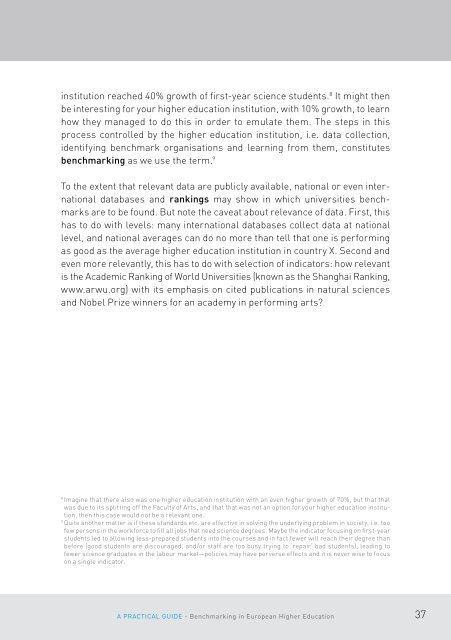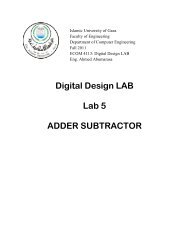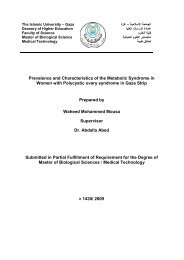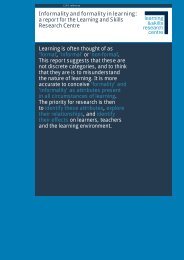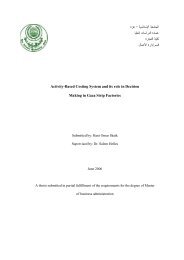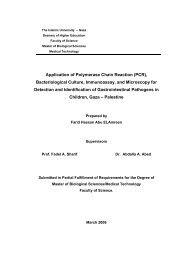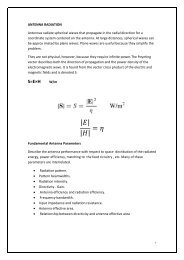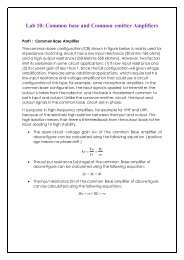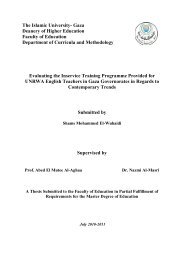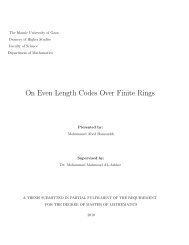A prActicAl guide Benchmarking in european Higher education
A prActicAl guide Benchmarking in european Higher education
A prActicAl guide Benchmarking in european Higher education
You also want an ePaper? Increase the reach of your titles
YUMPU automatically turns print PDFs into web optimized ePapers that Google loves.
<strong>in</strong>stitution reached 40% growth of first-year science students. 8 It might then<br />
be <strong>in</strong>terest<strong>in</strong>g for your higher <strong>education</strong> <strong>in</strong>stitution, with 10% growth, to learn<br />
how they managed to do this <strong>in</strong> order to emulate them. The steps <strong>in</strong> this<br />
process controlled by the higher <strong>education</strong> <strong>in</strong>stitution, i.e. data collection,<br />
identify<strong>in</strong>g benchmark organisations and learn<strong>in</strong>g from them, constitutes<br />
benchmark<strong>in</strong>g as we use the term. 9<br />
To the extent that relevant data are publicly available, national or even <strong>in</strong>ternational<br />
databases and rank<strong>in</strong>gs may show <strong>in</strong> which universities benchmarks<br />
are to be found. But note the caveat about relevance of data. First, this<br />
has to do with levels: many <strong>in</strong>ternational databases collect data at national<br />
level, and national averages can do no more than tell that one is perform<strong>in</strong>g<br />
as good as the average higher <strong>education</strong> <strong>in</strong>stitution <strong>in</strong> country X. Second and<br />
even more relevantly, this has to do with selection of <strong>in</strong>dicators: how relevant<br />
is the Academic Rank<strong>in</strong>g of World Universities (known as the Shanghai Rank<strong>in</strong>g,<br />
www.arwu.org) with its emphasis on cited publications <strong>in</strong> natural sciences<br />
and Nobel Prize w<strong>in</strong>ners for an academy <strong>in</strong> perform<strong>in</strong>g arts?<br />
8<br />
Imag<strong>in</strong>e that there also was one higher <strong>education</strong> <strong>in</strong>stitution with an even higher growth of 70%, but that that<br />
was due to its splitt<strong>in</strong>g off the Faculty of Arts, and that that was not an option for your higher <strong>education</strong> <strong>in</strong>stitution;<br />
then this case would not be a relevant one.<br />
9<br />
Quite another matter is if these standards etc. are effective <strong>in</strong> solv<strong>in</strong>g the underly<strong>in</strong>g problem <strong>in</strong> society, i.e. too<br />
few persons <strong>in</strong> the workforce to fill all jobs that need science degrees. Maybe the <strong>in</strong>dicator focus<strong>in</strong>g on first-year<br />
students led to allow<strong>in</strong>g less-prepared students <strong>in</strong>to the courses and <strong>in</strong> fact fewer will reach their degree than<br />
before (good students are discouraged, and/or staff are too busy try<strong>in</strong>g to ‘repair’ bad students), lead<strong>in</strong>g to<br />
fewer science graduates <strong>in</strong> the labour market—policies may have perverse effects and it is never wise to focus<br />
on a s<strong>in</strong>gle <strong>in</strong>dicator.<br />
A Practical Guide - <strong>Benchmark<strong>in</strong>g</strong> <strong>in</strong> European <strong>Higher</strong> Education<br />
37


